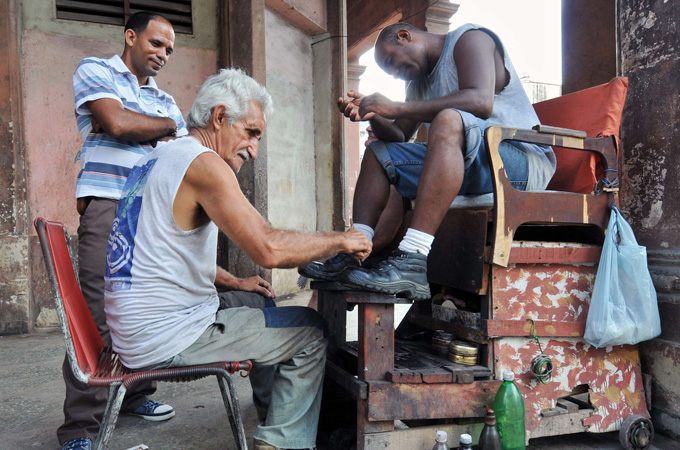Cubans queue for business permits
Residents flock to government offices in Havana as Cuba makes official private sector rules announced last month.

 |
| Under the new measures, Cubans will be able to open restaurants, repair homes and cars and provide transport [AFP] |
Cubans have begun queuing outside government offices across the capital, Havana, to register their own businesses as the country made official a sweeping economic overhaul announced last month.
Cuba unveiled new rules for broader self-employment in the government Gazette on Monday, a month after announcing new guidelines for free enterprise activities in 178 fields.
The government said last month that it planned to expand its private sector in an effort to help preserve socialism, but the rules did not become law until they were published on Monday.
Under the new measures, Cubans will be able to open restaurants, repair homes and cars, train animals, sell wine, provide transport, work as clowns and open many other businesses, some currently prohibited by the communist-led government.
“I hope this licence will bring me a better future,” the Associated Press news agency quoted Lazaro Ramos, who was one of about 20 people waiting outside a government office in Havana’s 10 de Octubre neighbourhood, as saying on Monday.
Ramos, 34, said he was unemployed but was hoping to get permission to make piñatas for children’s parties. “The economy is not good. But with this, I will be able to make ends meet.”
Simplified tax system
Under the rules detailed in the Gazette, authorities said the majority of the country’s new self-employed license owners will be eligible for a simplified tax system that establishes a monthly quota regardless of revenue.
For example, parking attendants would pay 80 pesos ($4) a month, while typing instructors would have to pay more than 100 pesos ($5) monthly, and barbers would be forced to pay the highest fees at 200 pesos ($10) a month.
Those not eligible for the simplified tax system – with jobs such as taxi driver, plumber and rooming house operator – will pay a 25 per cent income tax on the first 10,000 pesos ($476) earned each year, with the rate rising for those who earn more.
Income exceeding 50,000 pesos ($2,381) a year will be taxed at 50 per cent.
State worker layoffs
The guidelines are part of a plan to deal with some half a million state workers to be laid off by March 2011. Authorities announced on September 13 that the government would lay off 500,000 workers and absorb many of them into the private sector.
The new rules will allow Cubans over the age of 17 to start their own business, so long as they are permanent residents.
Cuba’s inefficient economy, crippled by a US trade embargo for nearly five decades, has been suffering for years, and the government of Raul Castro has begun to allow an expansion of small-scale private enterprise.
Similar steps were taken in the 1990s as Cuba struggled to survive when its economy collapsed after the fall of the Caribbean island’s principal benefactor, the Soviet Union.
In 1996, the number of self-employed peaked at 209,000, but when the economy improved, the government, in the name of ideological purity, backed off the reforms and restricted the issuance of new licences.